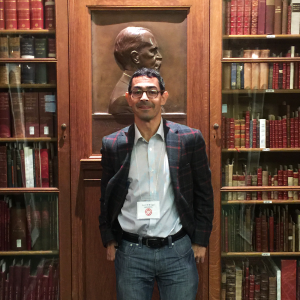Takeaway
A novel reminded me about best practices in caring for the dying. “The Collected Regrets of Clover” repeatedly stressed to acknowledge the emotional complexities surrounding death and to never look away from someone’s pain.

Lifelong Learning in Clinical Excellence | September 16, 2024 | 3 min read
By Scott Wright, MD, Johns Hopkins Medicine
This piece started out as a book review. I recently read “The Collected Regrets of Clover” by Mikki Brammer. It’s a great read and I recommend it highly. It has plot turns, unexpected story lines, terrific characters, and even a bit of romance. It’s funny too, even though the main theme is death and dying. Book review over.
In medicine, we see death and dying. My exposure to it has been extensive—I trained in McGill’s palliative care unit with the renowned Dr. Balfour Mount, have worked on inpatient acute medicine units for the past 33 years, and the palliative care group for our hospital sits within our division of general internal medicine, where I work. I’ve witnessed much and learned from exemplary role model colleagues, patients, and family members of those who passed under our care. Still, this book, and Clover’s approaches as a death doula, prompted me to think again about best approaches to support those who are dying and how I might do better.
Below are a few things I learned and insights from the book that resonated with me:
1. Some dying individuals have significant regrets that become more upsetting as the end of their life draws near. While it’s rarely possible for the dying to impact these situations, inviting them to speak about regrets may bring peace.
2. Some are very comfortable and at peace with dying. Others are not. Healthcare professionals caring for those at the end of their lives should probably assess the level of comfort or angst related to death for each dying patient.
3. Clover’s experiences and interactions with various people who were dying established a “closeness” to death that seemed to lead to her own “avoidance of truly living.” This may have been a function of her outlook and personality. Nonetheless, it prompted me to look in the mirror and consider what impact caring for the dying has on those who care for severely ill patients. I hope this reflection will push me to more enthusiastically live each day ,because we know all too well not to take tomorrow for granted.
4. This story made me realize that having the money to hire a death doula is a comfort or luxury that many cannot afford.
5. Based on how Clover served her patients, these are things we can all try to do more of when we’re with a person who is approaching death: (i) sit with them (ii) listen attentively (iii) embrace silence (iv) ask if there is something you can do to make the present moment easier, and (v) if true, let them know that you are comfortable and have come to terms with their passing.
To end this piece, here are two especially thoughtful quotes from Clover:
“The most important thing is never to look away from someone’s pain. Not just the physical pain of their body shutting down, but the emotional pain of watching their life end while knowing they could have lived it better. Giving someone the chance to be seen at their most vulnerable is much more healing than any words.”
“When I first started working as a death doula, I’d naively tried to get people to focus on all the positive things about their life—all the things they should be grateful for. But when someone has spent their years angry at the world, death just feels like one final cruel blow. Eventually, I realized that it wasn’t my job to help them gloss over that reality if they didn’t want to; it was to sit with them, listen, and bear witness. Even if they were unhappy right up until their final exhale, at least they weren’t alone.”
This piece expresses the views solely of the author. It does not necessarily represent the views of any organization, including Johns Hopkins Medicine.

